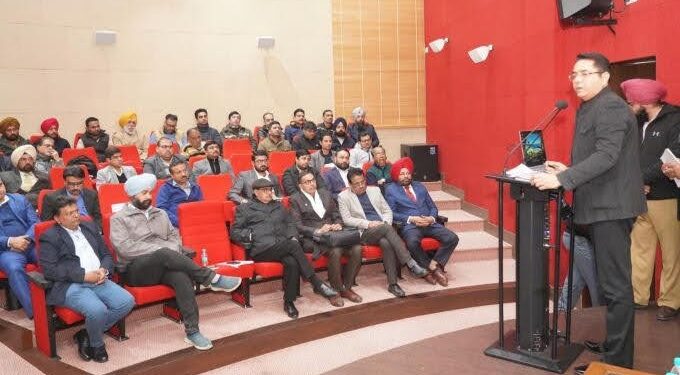• New & Renewable Energy Sources Minister chairs CBG Developers’ Meet, urges them to speed-up their projects
• 43 CBG Projects alloted by PEDA, on completion they will produce 515.58 TPD CBG, besides consuming 2 Millon Ton paddy straw per annum
Chandigarh, January 10:
In a bid to find a sustainable solution to the problem of stubble burning and supplement the income of farmers of the state, Chief Minister S Bhagwant Mann led Punjab Government has planned to utilize around 1.8 Million Ton (MT) paddy straw in the under implementation 43 Compressed Biogas (CBG) Projects per annum.
This was disclosed by Mr Aman Arora, Minister of New and Renewable Energy Sources, while chairing a CBG Developers’ Meet at PEDA Complex here on Tuesday.
Addressing the CBG Developers, the Cabinet Minister informed that the state is in process of forming Core Group of all stakeholders like PEDA, GAIL, CGD Companies, CBG producers and PBIP, to coordinate for off-take of CBG through gas pipelines.
He said that Asia’s largest CBG plant of total capacity 33.23 Ton Per Day (TPD) has already been commissioned in Sangrur and another CBG project of 12 TPD capacity has been commissioned at Khanna and is under trial run. Presently, about 3 Ton CBG is produced in the plant daily.
As many as 41 additional CBG projects, which have been allotted by Punjab Energy Development Agency (PEDA), are under implementation at various stages of execution and expected to be commissioned in next 2 years, he added.
On completion, all these projects will produce 515.58 TPD CBG per annum by consuming around 2 million ton Agriculture residue annually, said Mr. Aman Arora, while adding that the state has a potential to set up 200 more CBG projects of 10 TPD capacity each in addition to the above projects as around 20 millon ton of paddy straw is produced per annum in the state.
Assuring every possible support to CBG developers from the state government side, Mr. Aman Arora said that Punjab Government has been providing many incentives such as exemption from land registration charges & stamp duty, electricity charges, exemption from CLU & EDC charges, besides ensuring all facilities at Single Stop Clearances through Invest Punjab.
Mr. Aman Arora said that Punjab Government has already constituted a Task Force for off-take of Fermented Organic Manure (FOM) produced by CBG projects based on agriculture residue in the State. He said that Punjab Agricultural University (PAU), Ludhiana has already been directed to conduct feasibility study on FOM for its utilization in Agriculture and Horticulture and submit detailed report.
With the concerted efforts of the State Government, he further informed, Ministry of New and Renewable Energy (MNRE), GoI, vide its notification dated 02.11.2022, has revived the provision of Central Financial Assistance (CFA) on CBG projects which is Rs. 4.00 Crore per 4.8 TPD capacity CBG project. Maximum CFA is Rs. 10 Crore per project.
VC Punjab Agricultural University (PAU), Ludhiana Dr. Satbir Singh Gosal apprised that PAU is conducting a feasibility study on FOM utilization and will issue an advisory in this regard in this April.
Welcoming the CBG Developers in the meet, Chairman PEDA Sh. H.S. Hanspal said that CBG projects are the answer to agriculture residue, carbon emissions and pollution. Your efforts will be considered the service to country. It will create additional revenue source for farmers, besides giving boost to entrepreneurship and rural economy.
Chief Executive PEDA Mr. Sumeet Jarangal said that Punjab has emerged as the one of the most favourable states for the entrepreneurs due to Ease of Doing Business policy of the Mann Government. He said that Hindustan Petroleum Corporation Ltd. (HPCL) is also establishing a Bio-Ethanol project in Bathinda district, which will produce 100 Kilolitre 2G Ethanol by consuming two Lac Ton paddy straw. This project is expected to be commissioned in February 2024.
The function was attended by around 100 prominent CBG Developers and senior officials of the state government.








